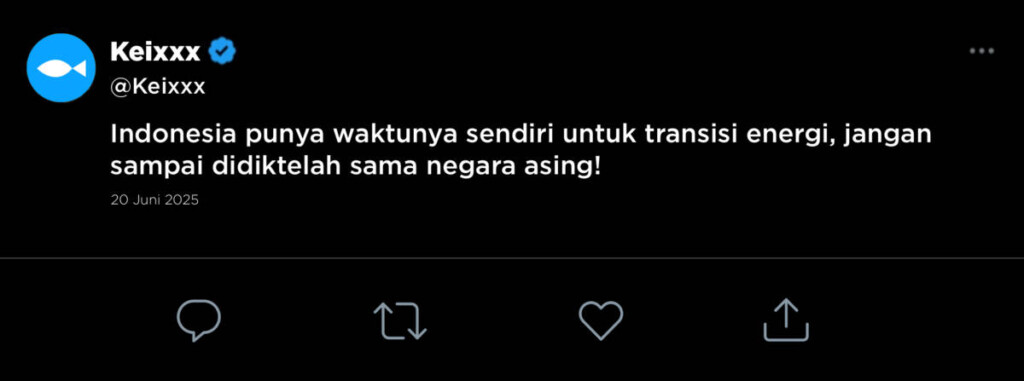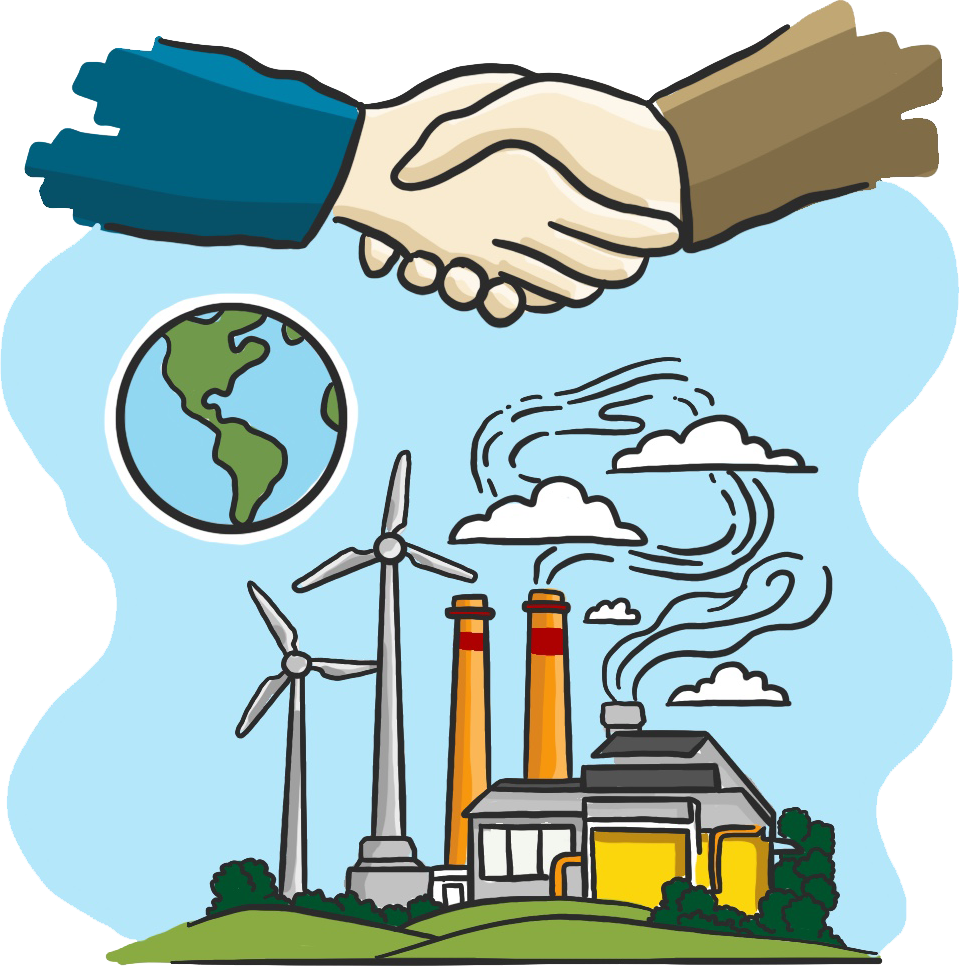Why Indonesia Must Make an Energy Transition?
Indonesia is Already Bound by the Paris Agreement

The assumption:
“Indonesia doesn’t need to focus on global energy transition targets, but rather implement a transition that suits Indonesian conditions.”
However:
As a signatory to the 2015 Paris Agreement, Indonesia has an obligation to contribute to efforts to limit global temperature rise to no more than 1.5 degrees Celsius and achieve net-zero emissions by 2050.
Explanation:
Indonesia is one of the countries that ratified the Paris Agreement in 2015. This means Indonesia is committed to contributing to global efforts to limit global temperature rise to no more than 1.5°C and achieve net-zero emissions (NZE) by 2050. Following the global energy transition schedule is crucial for Indonesia. This not only contributes to global commitments, but also helps to protect the country from a situation of acute dependence on fossil fuels (carbon lock-in), where excessive fossil fuel-based infrastructure hinders the transition to cleaner energy sources.
- Following the path and timelines of global agreements on energy transition targets does not mean Indonesia is being “dictated” by other countries, but rather demonstrates that Indonesia is keeping its promises.
- A 2019 study by Bappenas (National Development Planning Agency) on Low Carbon Development Indonesia (Low Carbon Development Indonesia 2019) found that if Indonesia wants to become a developed country and escape the middle-income trap, future development must be based on low-carbon development. This means that the use of fossil fuels must be immediately limited and gradually phased out.
- The longer fossil fuels are used, the more vulnerable Indonesia is to carbon lock-in, meaning that fossil fuel infrastructure is over-developed and will require enormous costs to transform.
- With the increasingly short time available to promote various efforts to mitigate global warming and climate change, urgently transforming the energy system is a necessity and imperative.

IESR Words
- “Indonesia is currently a member of the Paris Agreement. While countries, including Indonesia, are given the freedom to determine mitigation efforts and their timing based on their own capabilities, Indonesia has significant potential to accelerate its economic transformation from fossil fuels to renewable energy sources, particularly given its abundant renewable energy potential. This not only contributes to environmental quality and emissions reductions, but also provides other added value, such as creating new green jobs and increasing its GDP percentage (IRENA 2023).”
– Arief Rosadi, Climate and Energy Diplomacy Program Manager, IESR
1. The target timeline for global climate efforts is a collective decision, of which Indonesia is a member. Indonesia is obligated to comply with the commitments made in international forums. The Paris Agreement clearly states that humanity must maintain a 2-degree global temperature rise by 2100, or strive for 1.5 degrees Celsius by 2100, starting from the pre-industrial era. Indonesia’s membership in the United Nations Framework Convention on Climate Change (UNFCCC) signifies that the target timeline for global climate commitments reflects Indonesia’s interests.
2. Indonesia must accelerate its green economy agenda by phasing out coal-fired power plants. This contributes to Indonesia’s comparative advantage and its ability to compete globally as it enters the era of established green industries (a case study on this is China’s leadership in the EV and PV manufacturing industries – Hilton, Isabel 2024).
Description for
Children (14-18 years):

Adi and Budi are brothers. They agreed to clean the yard of fallen leaves that afternoon. But by the time the sun started to set, Budi still hadn’t arrived. It turned out, Budi was busy playing and chasing butterflies. Adi ended up cleaning the yard alone. He didn’t realize, the leaves continued to fall and gradually piled up until they almost covered his body! The yard remained a mess, and Mama gave them a long lecture. Well, that’s what happens if you don’t keep your promise! It can make things even more complicated.

Likewise, Indonesia must keep its decision to join the global agreement. If implemented, the promises in this agreement will bring long-term benefits to Indonesia. These benefits include maintaining sustainable resources, controlling emissions, and improving energy security due to reduced dependence on fossil fuels, such as fuel imports. By fulfilling its commitments to the global agreement, Indonesia will also strengthen its position and relationships internationally.
Description for
Adults (19 years and over):
Global agreements like the Paris Agreement are the result of negotiations. In the process of creating them, countries, including Indonesia, naturally voiced their interests. Therefore, when Indonesia decided to sign and commit to achieving the climate targets agreed upon in the Paris Agreement, it was not because other countries dictated to it. Rather, it was because Indonesia was taking on a global responsibility to protect the earth. The goal was clear: to ensure that future generations would inherit and live on a rich and resource-rich earth.
